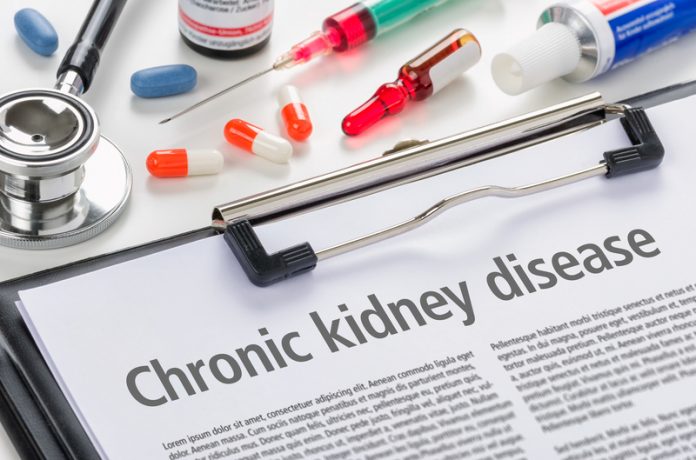The topic of Chronic Kidney Disease (CKD) is placed under the spotlight by experts from the London School of Hygiene and Tropical Medicine, the Primary Care Cardiovascular Society and the charity Kidney Care UK
Good kidney function is vital to a healthy life. The importance of the kidneys is often poorly understood by patients and the public and even by some professionals. The recent National CKD audit is a strong indication that there is more work to be done in this area.
About the kidneys
- They remove waste products from normal metabolism with an effective filter in 1 million filtration units in each kidney called glomerulii.
- They balance fluid levels in the body and reabsorb over 95% of the fluid they filter.
- They activate vitamin D which is important to maintain strong bones.
- They produce a hormone called erythropoietin (EPO) which stimulates the bone marrow to make red blood cells and prevent anaemia.
- They produce hormones to control blood pressure levels.
- The majority of drugs require removal from the body after they have been active.
The kidneys are so efficient that function can fall below 20% before we have symptoms from loss of function; but they can be damaged, particularly by diabetes and high blood pressure.
Moderate to severe Chronic Kidney Disease (CKD), where kidney function is less than 60%, affects approximately 5.5% of UK adults and is more common in older people. (1) Some people argue that CKD is an ‘overdiagnosed’ condition and that there is no reason to unnecessarily label people with CKD.
However, whilst it is true that there is evidence of CKD in 40% of people over 75, CKD is clinically important because it contributes to an excess risk of cardiovascular disease (heart disease and strokes). The presence of CKD means that some drugs are not properly cleared from the body and it makes someone more susceptible to sudden worsening of kidney function (Acute Kidney Injury, or AKI) at times when patients are otherwise unwell.
Although only a small number of people with CKD progress to end stage renal disease requiring dialysis (or, if possible, a kidney transplant), this reduces quality of life, is very difficult for patients and their families and very costly for the health economy.
Patients in the community are managed by the GP who maintains an electronic health record and including entering diagnoses using Read Codes. These codes can then be systematically searched to enable appropriate care for people with disease. Improving identification and CKD recording (coding) in primary care delivers many benefits for people with CKD (3-5).
- It enables personalised information and education about CKD for the individual. This includes informing patients with reduced kidney function that they should seek timely treatment when acutely unwell (dehydration, vomiting, high fever) to prevent acute kidney injury and of the risk of non-steroidal pain killers such as ibuprofen which may cause further kidney damage especially when taken with ACE-inhibitor and diuretic drugs.
- Opportunities to make lifestyle changes that will help maintain kidney health (weight loss, dietary salt reduction, stopping smoking).
- Practices can set up systems of regular review of kidney function to detect those who progress.
- Improved management of blood pressure, cardiovascular and infection risk. All patients with kidney disease qualify for statin drug therapy to prevent heart attacks and strokes and appropriate immunisation.
- Recognising the presence of CKD enables safer prescribing of medication. Many drugs are excreted by the kidney and the drug dosage needs to be adjusted accordingly.
Through the National CKD Audit, the effectiveness of Chronic Kidney Disease identification and management in primary care was studied in 1,024 primary care practices in England and Wales between April 2015 and June 2016. The Audit has produced the largest sample of patients with CKD in primary care globally; practices who participated in the Audit represent approximately 75% of all Welsh practices and 10% of those in England.
The first part of the National Report, published in January 2017, focussed on the identification and management of CKD in primary care (4). It showed that whilst in the majority of cases blood tests for CKD are done, there is great variation on who receives urinary tests. We can detect evidence of kidney damage from blood tests by measuring levels of creatinine, a by-product of muscle metabolism, or by testing the urine looking for levels of a protein called albumin.
Among those identified by blood tests, the percentage of CKD cases that were uncoded ranged from 0% to 80% between GP practices. There was considerable practice variation in achieved blood pressure control, statin prescription and pneumococcal vaccination for those with CKD.
The second part of the National Report, published in December 2017, focussed on outcomes for people with CKD. It showed that CKD in the community posed a massive burden to patients and secondary care and that people with CKD have an increased risk of hospital admission and death. (2)
Data suggested that unplanned admissions and deaths were more likely among people with CKD that had not been correctly coded in primary care compared to those who were coded; these differences in outcomes were not explained by differences in age. The magnitude of the difference between the rate of unplanned admissions and deaths for patients who were coded, compared with those who were not, increased as kidney function declined.
Summary findings of patient outcomes
Patients with chronic kidney disease and moderate to severe function impairment.
- For every 100 patients, there are 38 unplanned admissions per year.
- For every 100 patients, there are 7 AKI events occurring at time of admission per year.
- For every 100 patients, there are 6 CV events per year.
- For every 100 patients, there are 2 admissions to the ICU per year.
- For every 100 patients, there are 7 deaths per year.
- Approximately 95% of patients with CKD stage 3-5 who had a GP nephrology referral code have a corresponding nephrology outpatient appointment within 18 weeks.
There are a range of medical conditions and social circumstances which were not captured by the Audit data, which in some cases might account for both the reason why a patient is not coded and why they have an emergency admission or an additional risk of death. Hence, further research is needed to conclusively prove that Read coding CKD in primary care (and the related actions when identifying and managing those patients) indeed prevents hospitalisations and deaths. However, there is good evidence that Read coding in primary care is associated with increased clinical scrutiny (6).
Overall, the existing data strongly suggest that there is good reason to actively promote CKD diagnosis because it enables informed clinical shared decision making with patients and there are clear improvements in management, prescribing and engagement which flow from having identified patients with CKD.
References
1 NITSCH, D., CAPLIN, B., HULL, S. &WHEELER, D.C. on behalf of the National CKD Audit and Quality Improvement Programme in Primary Care, First National CKD Audit Report 2017.
2 NATIONAL INSTITUTE FOR HEALTH AND CARE EXCELLENCE 2011. Chronic kidney disease in adults: Quality standard
3 NATIONAL INSTITUTE FOR HEALTH AND CARE EXCELLENCE 2014b. Chronic Kidney Disease: Early Identification and Management of Chronic Kidney Disease in Adults in Primary and Secondary Care. 182 ed. UK.
4 LV, J., EHTESHAMI, P., SARNAK, M. J., TIGHIOUART, H., JUN, M., NINOMIYA, T., FOOTE, C., RODGERS, A., ZHANG, H., WANG, H., STRIPPOLI, G. F. & PERKOVIC, V. 2013. Effects of intensive blood pressure lowering on the progression of chronic kidney disease: a systematic review and meta-analysis. CMAJ, 185, 949-57.
5 JAIN, P., CALVERT, M., COCKWELL, P. & MCMANUS, R. J. 2014. The need for improved identification and accurate classification of stages 3-5 Chronic Kidney Disease in primary care: retrospective cohort study. PLoS One, 9, e100831.
6 KIM, L.G., CLEARY, F., WHEELER, D.C., CAPLIN, B., NITSCH, D., HULL & S.A. 2017How do primary care doctors in England and Wales code and manage people with chronic kidney disease? Results from the National Chronic Kidney Disease Audit. NDT (in press).
Dorothea Nitsch MD MSc
Professor of Clinical Epidemiology Department of
Non-Communicable Disease Epidemiology
Faculty of Epidemiology & Population Health
London School of Hygiene and Tropical Medicine
Kathryn E Griffith BM BS MSc FRCP MRCGP
RCGP Clinical Lead for Kidney Care
Cardiovascular Lead for Vale of York CCG
Secretary of PCCS, the Primary Care Cardiovascular Society
Fiona Loud
Policy Director
Kidney Care UK
Tel: +44 (0)1420 541 424











